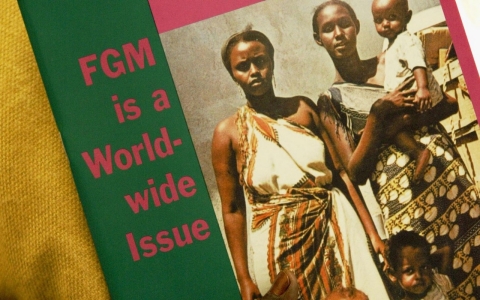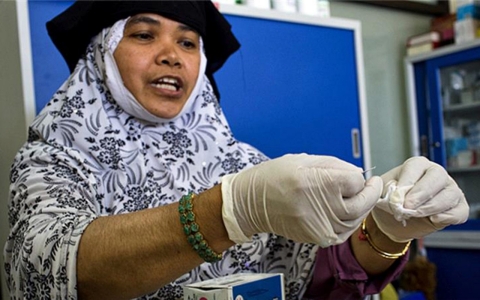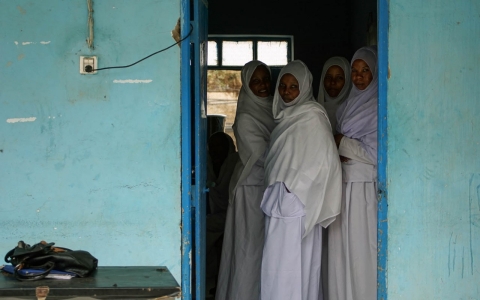There are at least 200 million girls and women around the world who have undergone female genital mutilation (FGM), with nearly a quarter of them being under the age of 14 when they were cut, according to a new report released by the U.N. children’s agency (UNICEF) on Wednesday.
Exact numbers are hard to come by, as few of the 30 countries where FGM is practiced keep reliable data on the procedure, relying primarily on household surveys. However, this is the strongest dataset to date, said Claudia Cappa, who led UNICEF’s statistics team on the report.
“So now we know that the practice is more global than we originally thought,” she told Al Jazeera. Previous UNICEF surveys had the number of women and girls affected worldwide at roughly 125 million.
“If we go historically, the availability of the data was mostly concentrated in Africa for a very long time, because this is where it was believe that the practice existed,” said Cappa.
But UNICEF’s new data shows that FGM is done more commonly than previously thought in several Middle Eastern countries, as well as Central and South Asian countries. Cases have also been reported in North America and Australia, as well as Latin America.
Many of the countries where the practice is common, such as Yemen, carry out the procedure on infants in their first week of life. FGM is carried out for various reasons across many cultures, out of tribal tradition or other beliefs about tempering female behavior.
Female genital mutilation is a term used to describe a variety of practices that involve cutting female genitalia and sometimes stitching the labia shut. It can result in infection, infertility and, in some cases, death.
The procedure is often carried out by traditional practitioners who lack proper medical training.
Although the practice is more widespread than previously known, Cappa said that overall the global prevalence of FGM is declining.
“The risk [of undergoing the procedure] overall has decreased for a girl,” she said. For instance, Burkina Faso and Egypt are among the countries where the practice is still common, though, she said, “less universal,” while FGM has all but disappeared in Togo.
In trying to put an end to FGM, Cappa concedes that understanding why it’s done in the first place is crucial.
“The most commonly given reason [for doing FGM] by both men and women is ‘because of social acceptance’ … it’s something to be perceived as necessary for a girl to be accepted in a community where certain values and certain traditions are taking place — surrounding purity, for instance, virginity, marriageability of a girl,” she said.
Women think, she added, that this is what’s expected of them and their daughters. Successful initiatives, she said, are those that target those values and norms.
Even changing laws before changing social attitudes, said Cappa, will not yield real change.
For instance, FGM has been outlawed in Egypt since 2008. The country, where the UNICEF report indicates that 87 percent of girls and women between the ages of 15 and 19 underwent the procedure between 2004 and 2015, has seen only one FGM case in its courts.
Dr. Raslan Fadl was charged in the death of Soheir al-Batea. The 13-year-old girl died after undergoing the procedure carried out by Fadl. He was initially acquitted of the charges in November 2014 but was ultimately found guilty in January of 2015.
The verdict was lauded as “historic” by rights activists.
However, National Public Radio reported in December that Fadl has not served a single day behind bars. He is still practicing medicine and working at a government hospital.
“Despite the first ever conviction for FGM in Egypt, by not apprehending and punishing the perpetrator, the authorities have sent a message to society that individuals won’t be punished for committing FGM, even those that result in deaths of girls,” said Rothna Begum, a researcher for Human Rights Watch’s Women’s Rights division.
“The Egyptian authorities should be doing far more, including adequately investigating cases and areas where FGM is being practiced, prosecuting such suspects and punishing those that are convicted,” she told Al Jazeera, adding that, unless the law is rigorously applied, “there will be many more Soheirs.”

New estimates suggest more than half a million women and girls in US have suffered procedure or are at risk

FGM is a common cultural practice in southern Thailand and, with little regulation, concerns are at an all-time high

How a school for midwives in eastern Sudan is empowering and educating women and girls about FGM






Error
Sorry, your comment was not saved due to a technical problem. Please try again later or using a different browser.